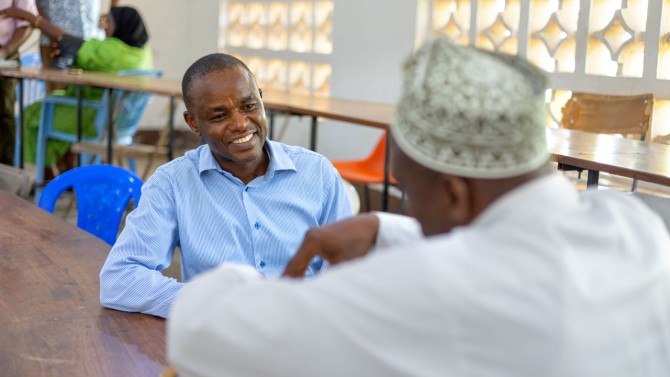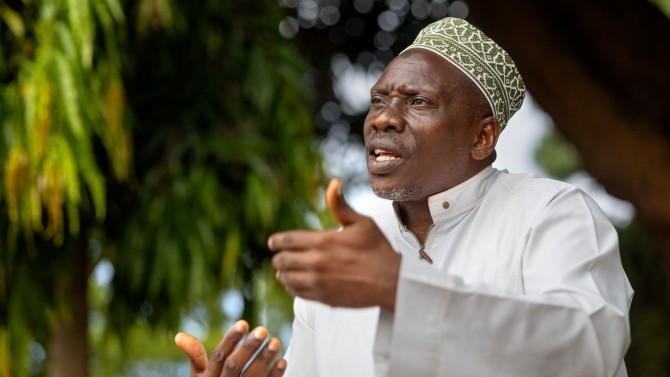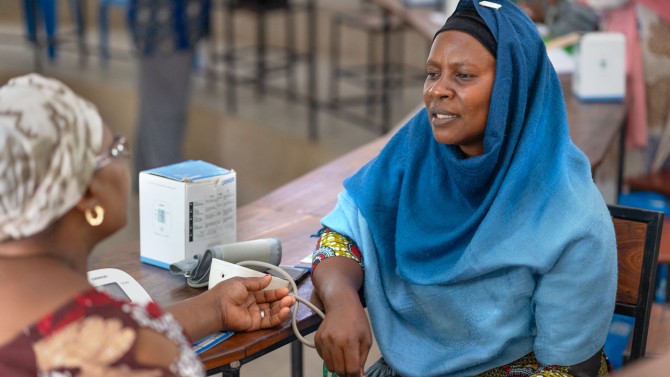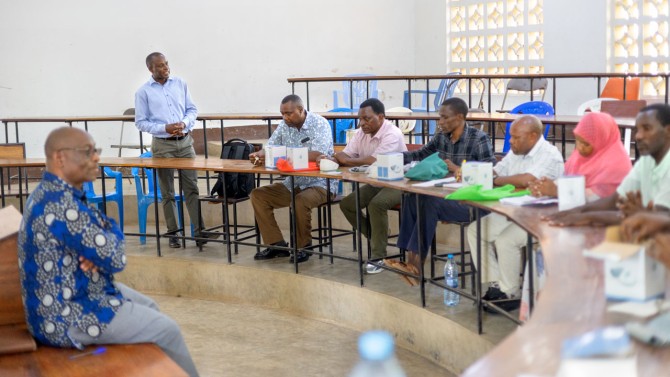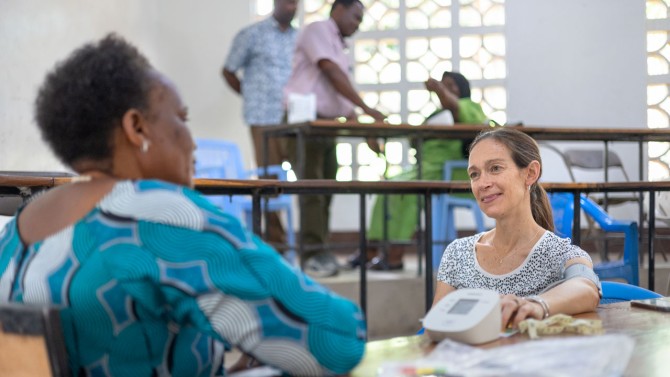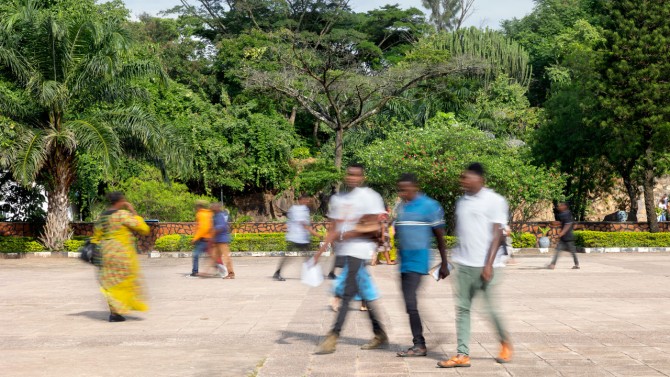Religious leaders, physicians fight hypertension in Tanzania and beyond
By Susan Kelley Noël Heaney
This is Part 2 of a five-part multimedia feature, Dispatches from Mwanza, about Weill Cornell Medicine’s collaboration with Weill Bugando School of Medicine to improve health care in Tanzania, the U.S. and around the world.
When he looks out onto his congregation, Sheikh Hassani Yassini Mchondo sees a silent killer.
Fathers in their 30s and 40s collapse, suddenly disabled. Some even die. Destitute widows can’t pay for their children's school uniforms and fees. Kids drop out of school and beg in the streets – all because of untreated hypertension.
“It hurts the heart to watch people suffer, and my primary job as a leader is to protect my people,” said Mchondo, an imam who serves about 1,500 people in Tanzania’s Mwanza region. “That’s why we weren’t hesitant to cooperate to spread awareness about high blood pressure.”
Mchondo is one of 1,140 religious leaders in Tanzania collaborating on a large-scale study by researchers at Weill Cornell Medicine’s Center for Global Health and Tanzanian colleagues. The project asks an innovative question: Can religious leaders use their influence to help lower life-threatening hypertension in their communities?
The stakes are high. Hypertension can result in heart disease, heart and kidney failure, stroke, dementia, blindness and more. It is the world’s leading risk factor for premature death.
If successful, the strategy could prevent many thousands of deaths not only in Tanzania but throughout Africa, which has the highest age-adjusted rate of hypertension in the world. And it could benefit U.S. communities where hypertension outcomes are poor.
“Raising awareness about high blood pressure and letting people know about blood pressure, I think it’s really critical and can help save a lot of people,” said Dr. Bazil Baltazar Kavishe, who recently completed his Ph.D. at Weill Bugando School of Medicine, Weill Cornell Medicine’s collaborator in Tanzania. Kavishe, who oversees the study’s rollout, is now a senior researcher at Tanzania’s National Institute for Medical Research.
The problem is, hypertension has few symptoms. Most people don’t even know they have it. Although 28% of Tanzanians age 38 and older have hypertension, in rural areas only 2% were aware and 1% were being treated, according to the team’s 2015 study. “People may not take it seriously, because they are not feeling that they are sick,” Kavishe said. “It’s really a challenge to get this knowledge to people.”
To spread the word, the researchers are leveraging the clergy’s significant influence.
“They’re much more trusted than political leaders. They’re much more trusted than even health care workers,” said Dr. Robert Peck, co-principal investigator of the study and associate professor of medicine and of pediatrics at Weill Cornell Medicine.
The team has collaborated with a core group of clergy, including Mchondo, to educate other religious leaders in 10 communities in northwestern Tanzania. In turn, those leaders are educating and screening their own communities for hypertension and making referrals to local health facilities. In all, the intervention could reach up to 400,000 people.
“Working with religious leaders to bring those messages to communities and to talk about [how] you can have faith and still seek care for your health, and to show that those messages are consistent with scripture, both in Christianity and in Islam, has been an exciting approach to improving community health,” said Dr. Jennifer Downs, co-principal investigator and the Ehrenkranz Family/Orli R. Etingin, M.D. Associate Professor in Women’s Health at Weill Cornell Medicine.
Three years into the five-year study, it’s too soon to say whether the strategy will achieve the study's goal of lowering the overall average blood pressure in these communities. Doing so could decrease hypertension deaths there by 13%.
But the early results are intriguing, Downs said.
“It’s actually an exciting time in the trial,” she said. “We’re in the thick of it.”
‘We are family now’
With a practiced hand, Mchondo wrapped a blood pressure cuff around the upper arm of the Rev. Lupilya Gregory, his practice partner, during a refresher on how to screen for hypertension. It’s a protocol he has done thousands of times in the past year as part of the study.
He and 15 other religious leaders gathered in December at Mwanza Christian College in Mwanza, Tanzania, to review the protocol. Together the group has led the study’s effort to train 1,140 other clergy.
“You need to sit upright, feet on the floor and the cuff will tighten your arm. So don’t worry, relax, don’t talk,” Mchondo told Gregory. “Now I’m measuring your blood pressure and I’ll give you the results.”
He filled out a card with Gregory's second blood-pressure reading. He checked one of three color-coded boxes – green for a normal reading, yellow for a high reading, and red for very high. Those in the yellow and red are referred to their local health care facility. Mchondo encouraged Gregory to do physical activity at least 30 minutes per day and eat more fruits and vegetables.
“We try to educate them on the measures they can start taking on their own,” said Mchondo, who led some of the training seminars. “For example, if you reduce your salt intake, it’ll be easier for you to reduce your blood pressure, rather than waiting for the doctor to tell you to stop consuming salt.”
As they practiced the protocol, the clergy chatted and greeted each other warmly. They’ve worked together on the project since 2022.
At first, it wasn’t easy for the Muslims and Christians to collaborate, said Agrey Mwakisole, pastor and theologian at Mwanza Christian College, who leads the group. But they agreed to set aside their religious differences and focus on common ground.
“We are family now,” he said. “We are talking one language, and we are working as a team.”
They all see the way hypertension can devastate not only their people’s health but also their finances. Many Tanzanians struggle with food insecurity. About 75% live below the international poverty line of $100 in monthly income. A hospitalization can burn through a family’s entire savings and get them evicted, for example. Family members who travel long distances to help a sick relative can lose many days of income.
“So that’s affecting your family, affecting my family, affecting other families,” Mwakisole said. “One person can affect more than 20 people.”
Hypertension creates social conflict, too. When a person dies a sudden, immediate death, neighbors may accuse one another of witchcraft, Gregory said. When one of his family members died due to complications from high blood pressure, some blamed witchcraft. “I told them no, it was a stroke, and the stroke comes because of high blood pressure,” he said.
Others believe if their faith is strong enough, they will get well, Mchondo said. “People don’t even have money for food,” he said, let alone for insurance, which is expensive and doesn’t cover much. “They find leaving the situation to God a better option.”
Together the group helped design the seminar that trains other clergy. Over two days, religious leaders learned Christian and Islamic doctrine that supports healthy habits, and the medical aspects of hypertension and how to screen for it. The team recently described the curriculum in a paper in BMC Medical Education.
Clergy are perfectly positioned to deliver the message, Peck said. “They’re very gifted teachers. That’s what they do all the time,” he said. “It’s usually different material, but it’s the same skill set.”
Mwakisole takes a friendly approach to the education, he said. “Teaching is not forcing. Teaching is giving some knowledge to other people and changing behavior.”
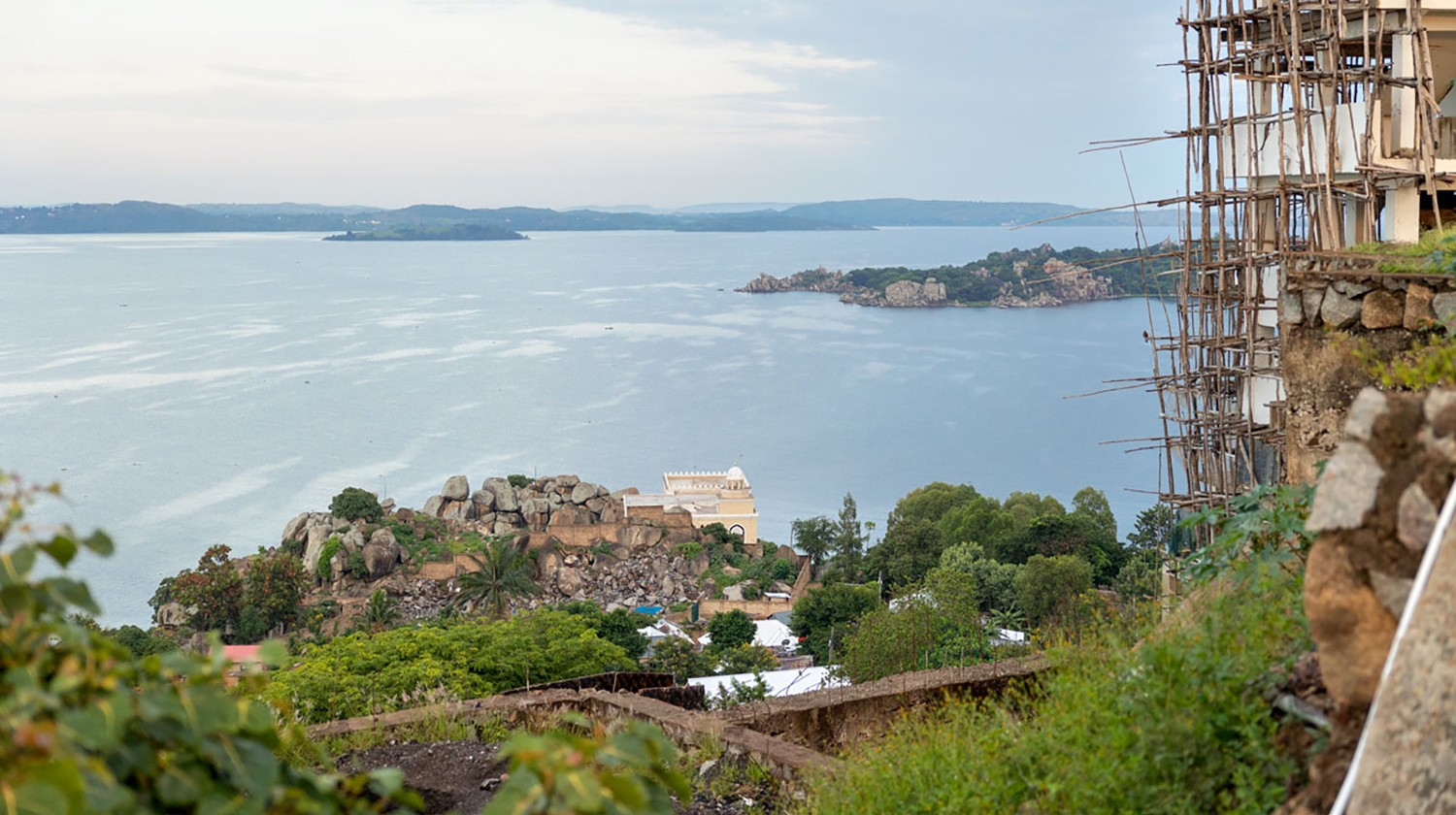
A mosque nestles in the rocks by Lake Victoria in Mwanza, Tanzania.
A complex intervention
Hypertension is prevalent in Africa for several reasons.
First is environment. Even up until 50 years ago, people in many parts of Tanzania didn’t have access to salt, and most had very low-salt diets. Now, with processed foods and salt readily available, people consume much more.
Stress and poverty drive hypertension around the world. “We’ve seen that in the U.S. time and time again,” Peck said. “Living in extreme poverty is a form of stress itself and creates a lot of other stress.”
People of African descent also have a genetic predisposition to retaining fluids, which contributes to high blood pressure. “Salt-sensitive hypertension appears to be particularly common in Africa. This might be related to living in an equatorial environment,” Peck said.
To combat those forces, religious leaders in the 10 intervention communities are now conducting screenings and education for 12 months, ending in July; the other 10 communities act as a control group and receive no intervention (but will after the study is completed). “At the end of one year, you will be able to see whether there is significant change in blood pressure in the intervention arm compared to the control arm,” Kavishe said.
After another year, the team will measure blood pressure in the intervention communities again, to assess the intervention’s sustainability two years after it began.
“It is a really complex intervention, but I think the teamwork is really making it happen, and we are glad about that,” Kavishe said.
He is a crucial part of creating that teamwork, Peck said. Kavishe is among the leading cardiovascular researchers in the country, and was in the first cohort of Ph.D.s to graduate from Weill Bugando School of Medicine, part of the Catholic University of Health and Allied Sciences.
“Not only does he know the system in Tanzania, he really has the grit and determination to get things done,” Peck said. “During rainy season in Tanzania, most of the roads are washed out, and Bazil knows how to work around that challenge, which occurs twice a year – to get the team into the field, to get to these villages.”
That’s important, Peck said, because the scope of the study “is massive.”
It has required outreach to national, regional and local governments and repeated, extensive collaboration with myriad stakeholders. But the effort is worth it, Peck said. “That sort of community engagement is so critical for conducting research in a way that is ethical and has maximal impact at a community level.”
Combatting hypertension in Tanzania
Twenty communities in northwestern Tanzania are participating in the study.


Knowledge, understanding, change
The study builds on a realization Downs had in the late 2000s: Her religious patients at Bugando Medical Centre in Mwanza didn’t always take the medications she prescribed. “If they weren’t sure if this is in line with their faith, they could just throw away those antibiotics. They might just say, ‘I have no need for this. I shouldn’t use this,’” said Downs, who is also associate professor of medicine at Weill Cornell Medicine.
Around the same time, the World Health Organization had advised that the best way to prevent HIV in sub-Saharan Africa was male circumcision, which reduces the spread of HIV by 60%. Large outreach campaigns encouraged men to get free circumcisions.
“It led us to wonder, how are religious leaders hearing these messages? Would religious teachings impede that or could they support that?” Downs said.
With those questions in mind, she and a team including Mwakisole conducted a study in 16 communities in Tanzania. In half, they taught religious leaders about the medical aspects of male circumcision; half got no instruction. The team saw a huge uptake in circumcision – 53% – in the communities where they had worked with clergy, compared to 30% in the control communities. “It really showed us that, OK, the concept was right,” Downs said.
In the course of the study, women frequently asked Downs for help with family planning. “Families have nine children and can’t even feed them and send them all to school,” she said.
So she conducted another study, collaborating again with Mwakisole, to test the effects of equipping clergy with medical and cultural information on family planning. Uptake of contraception at community health centers increased by 19%. And more than 40% of women who sought contraception in the intervention communities said a religious leader had advised them, compared to less than 1% in the control group.
So far, the clergy say their communities are receptive to the hypertension education.
Congregants wish they could have even more information about high blood pressure, Mchondo said. Thanks to screening, two women in Gregory's congregation discovered they were on the verge of becoming hypertensive. “They began changing their lifestyle to let it drop,” he said. “Now they have normal pressure. It was a blessing to them.”
And Mwakisole recently visited a village where people had begun growing more fruits and vegetables for themselves and their families.
“The Bible says, without knowledge, people are perishing,” he said. “When you give them knowledge, they come to understand, and change.”
This story and videos were developed and produced with support from Matt Fondeur, Lindsay France, Eduardo Merchán and Ashley Osburn.
Media Contact
Get Cornell news delivered right to your inbox.
Subscribe